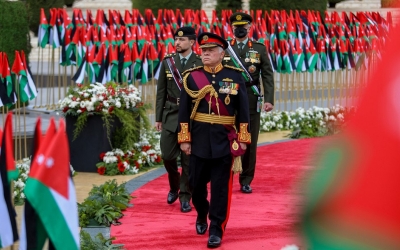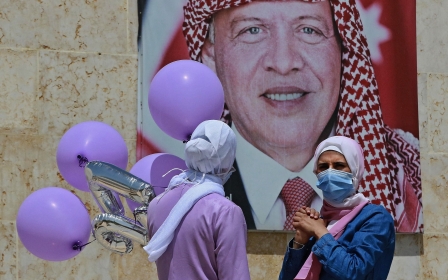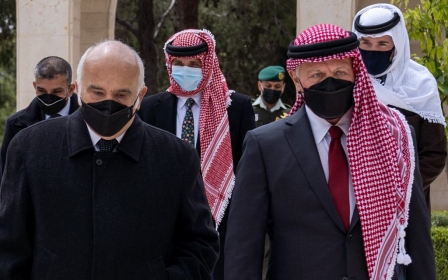Jordan media leak confessions of former royal aide week before sedition trial

Jordanian media has leaked purported confessions of Bassem Awadallah, a former finance minister and ex-head of the Royal Court, a week before his sedition plot trial is due to begin.
The document, published by several Jordanian mainstream news outlets on Tuesday, quotes Awadallah as saying that he has sought to use links with an unnamed Israeli person to retrieve his Jerusalem residency papers to pursue real estate deals.
It also reveals new details on meetings that took place last year between Awadallah and Prince Hamzah, King Abudallah's half-brother who was placed under house arrest in the latest crackdown over social media posts criticising the monarchy.
Awadallah's lawyer, Mohammad Afif, told CNN Arabic on Tuesday the alleged confessions cannot be confirmed nor denied at this stage, adding that the full investigation records will be made public after the start of the trial.
Awadallah and Sharif Hassan bin Zaid, a member of the Jordanian royal family, are the only two figures who remain in detention after the arrests that targeted 16 suspects over their alleged attempts to “destabilise” the kingdom in April.
According to the confessions that were part of a State Security Court report, Awadallah began his periodic meetings with Prince Hamzah in mid-2020. Awadallah said that these meetings were arranged by Sharif Hassan bin Zaid.
"Sharif Hassan informed me that Prince Hamzah is dissatisfied with the internal situation, and he wants to talk to me about this, and get advice from me, because I was a senior official in the royal court, and I am currently working in Saudi Arabia, and he is close to officials there," the leaked document quoted him as saying.
Awadallah is a former adviser to Saudi Crown Prince Mohammed bin Salman (MBS) and is also known to have close links to Abu Dhabi’s Crown Prince Mohammed bin Zayed.
"So I agreed to that, and indeed Prince Hamzah, in the same period, began to visit my house periodically, accompanied by Sharif Hassan, as it was clear from Prince Hamzah's speech that he is spiteful of the king, and blames him for all the mistakes of the state and successive governments," he added.
"And by virtue of my knowledge of Prince Hamzah's position on the king, I began to reciprocate his proposals and incite him against the king that he really was the cause of the deterioration of the internal situation, and at that time Prince Hamzah told me that he had no trust [in the king]."
The rift in Jordan's monarchy was triggered in March, when Prince Hamzah upstaged Jordan's crown prince by visiting the city of Salt to console relatives of Covid-19 patients who died after a hospital ran out of oxygen six days before Prince Hussein made that trip.
Awadallah stated that Prince Hamzah came to his house immediately after his return from Salt following the hospital incident, and presented him with a picture of his extensive visits to the Jordanian tribes to gain their loyalty. He allegedly informed him that he was not interested in the issue of Jerusalem, and did not place it on his priorities.
Awadallah added that he had revised and edited some of the messages concerning Prince Hamzah before they were published, and that "the prince was convinced that I was wronged by the people".
Awadallah's confessions also indicated that he had a friendship with an Israeli man who previously held the position of civil coordinator between the Israeli government and the Palestinian Authority, and that he had tried through him to recover his Jerusalem identity for the purposes of using them in land trade in the city.
Charges
Earlier this week, the public prosecutor of the State Security Court in Jordan approved the indictment issued against Awadallah and Hassan bin Zaid, a relative of the Jordanian king.
The court charged Awadallah and bin Zaid with the felony of “inciting opposition to the political regime in the Kingdom jointly”, and the felony of “carrying out acts that endanger the safety and security of society, and causing sedition jointly".
Hassan bin Zaid was additionally charged with “possession of a narcotic substance with the intent to use it”, and “the consumption of narcotics”.
Middle East Eye has previously revealed that Awadallah had been arrested in connection to the alleged plot after intelligence services intercepted voice and text messages between him and the Saudi crown prince, in which they discussed how to destabilise King Abdullah's rule.
The two men discussed how and when to use mounting popular unrest in Jordan, stoked by the kingdom’s flailing economy and the Covid-19 pandemic, a source close to the investigation told MEE.
Those messages were then shared with Washington, which prompted US President Joe Biden to issue a strong message of support for Abdullah hours after the arrests were made.
Publicly, Riyadh has declared its support for King Abdullah. However, during a Saudi delegation’s visit to Amman on 5 April seeking Awadallah’s release, Abdullah refused to meet the foreign minister and receive an official letter of support from King Salman.
The Washington Post reported on Saturday that former US President Donald Trump, MBS and former Israeli prime minister Benjamin Netanyahu had tried to undermine King Abdullah’s role as custodian of the holy sites in Jerusalem because of his perceived role as an obstacle to the so-called “deal of the century” and to normalisation of ties between Saudi Arabia and Israel.
“Awadallah was working to promote the ‘deal of the century’ and weaken Jordan’s position and the king’s position on Palestine and the Hashemite custodianship of Islamic and Christian holy sites in Jerusalem,” according to a Jordanian investigative report shared with the paper.
The Post cited a former US official as saying that Awadallah once said: “A sticking point for us is Al-Aqsa. The king [Abdullah] uses that to browbeat us and keep his role in the Middle East.”
The official Jordan News Agency, Petra, has quoted a source in the State Security Court as saying that the trial of Awadallah and bin Zaid is expected to start next week.
Middle East Eye delivers independent and unrivalled coverage and analysis of the Middle East, North Africa and beyond. To learn more about republishing this content and the associated fees, please fill out this form. More about MEE can be found here.






